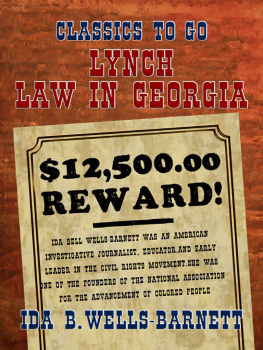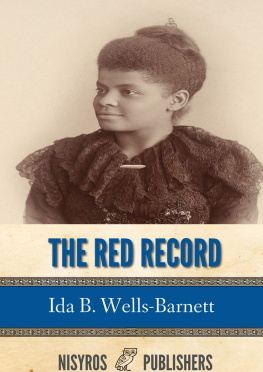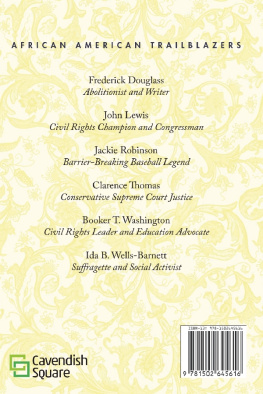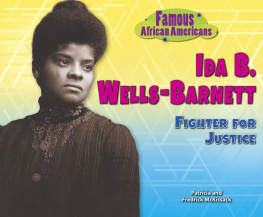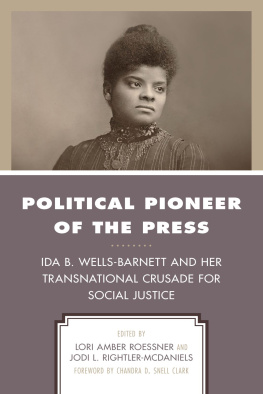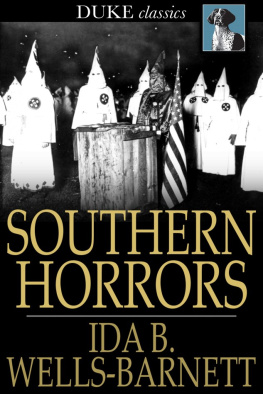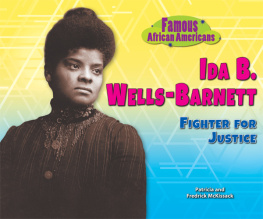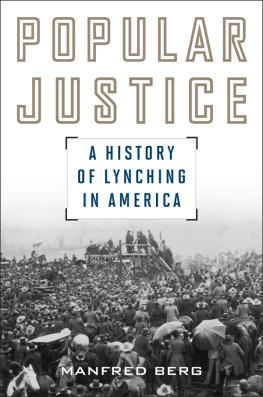Ida B. Wells-Barnett - Lynch Law in Georgia
Here you can read online Ida B. Wells-Barnett - Lynch Law in Georgia full text of the book (entire story) in english for free. Download pdf and epub, get meaning, cover and reviews about this ebook. year: 2021, publisher: Otbebookpublishing, genre: Detective and thriller. Description of the work, (preface) as well as reviews are available. Best literature library LitArk.com created for fans of good reading and offers a wide selection of genres:
Romance novel
Science fiction
Adventure
Detective
Science
History
Home and family
Prose
Art
Politics
Computer
Non-fiction
Religion
Business
Children
Humor
Choose a favorite category and find really read worthwhile books. Enjoy immersion in the world of imagination, feel the emotions of the characters or learn something new for yourself, make an fascinating discovery.
- Book:Lynch Law in Georgia
- Author:
- Publisher:Otbebookpublishing
- Genre:
- Year:2021
- Rating:3 / 5
- Favourites:Add to favourites
- Your mark:
- 60
- 1
- 2
- 3
- 4
- 5
Lynch Law in Georgia: summary, description and annotation
We offer to read an annotation, description, summary or preface (depends on what the author of the book "Lynch Law in Georgia" wrote himself). If you haven't found the necessary information about the book — write in the comments, we will try to find it.
Lynch Law in Georgia — read online for free the complete book (whole text) full work
Below is the text of the book, divided by pages. System saving the place of the last page read, allows you to conveniently read the book "Lynch Law in Georgia" online for free, without having to search again every time where you left off. Put a bookmark, and you can go to the page where you finished reading at any time.
Font size:
Interval:
Bookmark:
During six weeks of the months of March and April just past, twelve colored men were lynched in Georgia, the reign of outlawry culminating in the torture and hanging of the colored preacher, Elijah Strickland, and the burning alive of Samuel Wilkes, alias Hose, Sunday, April 23, 1899.
The real purpose of these savage demonstrations is to teach the Negro that in the South he has no rights that the law will enforce. Samuel Hose was burned to teach the Negroes that no matter what a white man does to them, they must not resist. Hose, a servant, had killed Cranford, his employer. An example must be made. Ordinary punishment was deemed inadequate. This Negro must be burned alive. To make the burning a certainty the charge of outrage was invented, and added to the charge of murder. The daily press offered reward for the capture of Hose and then openly incited the people to burn him as soon as caught. The mob carried out the plan in every savage detail.
Of the twelve men lynched during that reign of unspeakable barbarism, only one was even charged with an assault upon a woman. Yet Southern apologists justify their savagery on the ground that Negroes are lynched only because of their crimes against women.
The Southern press champions burning men alive, and says, Consider the facts. The colored people join issue and also say, Consider the facts. The colored people of Chicago employed a detective to go to Georgia, and his report in this pamphlet gives the facts. We give here the details of the lynching as they were reported in the Southern papers, then follows the report of the true facts as to the cause of the lynchings, as learned by the investigation. We submit all to the sober judgment of the Nation, confident that, in this cause, as well as all others, Truth is mighty and will prevail.
IDA B. WELLS-BARNETT.
2939 Princeton Avenue, Chicago, June 20, 1899.
NINE MEN LYNCHED ON SUSPICION.
In dealing with all vexed questions, the chief aim of every honest inquirer should be to ascertain the facts. No good purpose is subserved either by concealment on the one hand or exaggeration on the other. The truth, the whole truth and nothing but the truth, is the only sure foundation for just judgment.
The purpose of this pamphlet is to give the public the facts, in the belief that there is still a sense of justice in the American people, and that it will yet assert itself in condemnation of outlawry and in defense of oppressed and persecuted humanity. In this firm belief the following pages will describe the lynching of nine colored men, who were arrested near Palmetto, Georgia, about the middle of March, upon suspicion that they were implicated in the burning of the three houses in February preceding.
The nine suspects were not criminals, they were hard-working, law-abiding citizens, men of families. They had assaulted no woman, and, after the lapse of nearly a month, it could not be claimed that the fury of an insane mob made their butchery excusable. They were in the custody of the law, unarmed, chained together and helpless, awaiting their trial. They had no money to employ learned counsel to invoke the aid of technicalities to defeat justice. They were in custody of a white Sheriff, to be prosecuted by a white States Attorney, to be tried before a white judge, and by a white jury. Surely the guilty had no chance to escape.
Still they were lynched. That the awful story of their slaughter may not be considered overdrawn, the following description is taken from the columns of the Atlanta Journal, as it was written by Royal Daniel, a staff correspondent. The story of the lynching thus told is as follows:
Palmetto, Ga., March 16.A mob of more than 100 desperate men, armed with Winchesters and shotguns and pistols and wearing masks, rode into Palmetto at 1 oclock this morning and shot to death four Negro prisoners, desperately wounded another and with deliberate aim fired at four others, wounding two, believing the entire nine had been killed.
The boldness of the mob and the desperateness with which the murder was contemplated and executed, has torn the little town with excitement and anxiety.
All business has been suspended, and the town is under military patrol, and every male inhabitant is armed to the teeth, in anticipation of an outbreak which is expected to-night.
Last night nine Negroes were arrested and placed in the warehouse near the depot. The Negroes were charged with the burning of the two business blocks here in February.
At 1 oclock this morning the mob dashed into town while the people slept.
They rushed to the warehouse in which the nine Negroes were guarded by six white men.
The door was burst open and the guards were ordered to hold up their hands.
Then the mob fired two volleys into the line of trembling, wretched and pleading prisoners, and to make sure of their work, placed pistols in the dying mens faces and emptied the chambers.
Citizens who were aroused by the shooting and ran out to investigate the cause were driven to their homes at the point of guns and pistols and then the mob mounted their horses and dashed out of town, back into the woods and home again.
None of the mob was recognized, as their faces were completely concealed by masks. The men did their work orderly and coolly and exhibited a determination seldom equaled under similar circumstances.
The nine Negroes were tied with ropes and were helpless.
The guard was held at the muzzle of guns and threatened with death if a man moved.
Then the firing was deliberately done, volley by volley.
The Negroes now dead are: Tip Hudson, Bud Cotton, Ed Wynn, Henry Bingham.
Fatally shot and now dying: John Bigby.
Shot but will recover: John Jameson.
Arm broken: George Tatum.
Escaped without injury: Ison Brown, Clem Watts.
The men who were guarding the Negroes are well known and prominent citizens of Palmetto, and were sworn in only yesterday as a special guard for the night.
The commitment trial of the Negroes was set for 9 oclock this morning.
Bud Cotton, who was killed, had confessed to the burning of the stores in Palmetto, and had implicated all the others who had been arrested.
The military having been sent by Governor Candler arrived at 10:40 oclock this morning on a special train under command of Colonel John S. Candler.
The Negro population of Palmetto has fled from town and it is believed the Negroes are now congregating on the outskirts and will make an assault upon the town to-night.
The place is in the wildest excitement and every citizen is armed, expecting an outbreak as soon as night shall fall.
The Negroes left the town in droves early this morning, weeping and screaming and dogged and revengeful.
Business has been entirely suspended and Palmetto, formerly a peaceful agricultural village, is running riot with intense excitement and anxiety is expressed by every one.
The lives and property of citizens will be protected at any cost, and the white people, while condemning the act of lawlessness of the mob, are determined to meet any attempt the Negroes may make for revenge.
It was just past the hour of midnight. The guards were sleepy and tired of the weary watch and the little city of Palmetto was sound asleep, with nothing to disturb the midnight hour or to interrupt the crime that was about to be committed.
Without the slightest noise the mob of lynchers approached the door to the warehouse. Not a false step was made, not a dead leaf was trod upon and not even the creaking of a shoe or the clearing of a throat broke the stillness.
With a noise that shook the buildings and threw every man to his feet the big fireproof door was suddenly struck as if with the force of a battering ram.
Font size:
Interval:
Bookmark:
Similar books «Lynch Law in Georgia»
Look at similar books to Lynch Law in Georgia. We have selected literature similar in name and meaning in the hope of providing readers with more options to find new, interesting, not yet read works.
Discussion, reviews of the book Lynch Law in Georgia and just readers' own opinions. Leave your comments, write what you think about the work, its meaning or the main characters. Specify what exactly you liked and what you didn't like, and why you think so.

